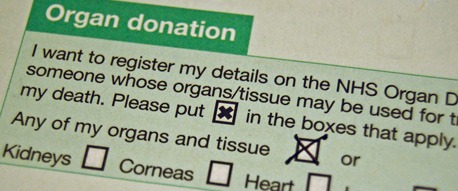by Dr Julian Hull, clinical lead for organ donation at Heart of England NHS

Thousands of life-saving transplant operations take place every year in the United Kingdom and there has been a steady increase in the number of transplant operations performed.
Over 3,500 transplant operations took place between April 2013 and April 2014. But over 7,000 people in the UK are still on the transplant waiting list and on average three people die every day waiting for a transplant.
The majority of people on the transplant waiting list are in need of a new vital organ to treat a life-threatening condition. Donating your organs really can make a massive difference to change the lives of desperately ill people and you can specify which organs you would like to donate, whether that be your kidneys, heart, liver, lungs, pancreas or small bowel.
When it comes to organ donation, one point to remember is that the donor and recipient must be checked to ensure compatibility and minimise the risk of organ rejection. This is a particular problem for patients with rare tissue types as matching donors are hard to find.
The need for organs in the Asian and black community is three to four times higher than that of the white community. Patients from Asian and black communities are more likely to need an organ transplant as they are more prone to illnesses such as diabetes and heart disease, all of which can result to organ failure. People from different ethnic backgrounds have a greater chance of survival if their new organ was donated by someone of the same ethnicity as the tissue matching is better.
So how can you donate your organs and join the NHS Organ Donor Register? You can fill in an online form at www.organdonation.nhs.uk or call the 24-hour NHS Donor Line on 0300 123 23 23. You can also join when registering at a GP’s surgery, for a driving license, or for a European Health Insurance Card, as well as when you apply for a Boots Advantage Card. Anyone can join the Organ Donor Register. Children can sign up to the Register but their parents or those with parental responsibility will be asked to provide their consent.
There are three different types of organ donation you need to familiarise yourself with. Firstly the majority of organs donated are by patients who die in hospital whilst on a ventilator on an Intensive Care Unit as a result of severe head injuries, stroke or brain haemorrhage. Brain stem tests are then carried out to confirm death before any action is taken. These donors are often called ‘heart beating donors.’ The heart continues to beat because a mechanical ventilator is used to keep organs oxygenated through the lungs after the patient’s death.
Secondly patients can donate organs following cardiac death which is mainly referred to as ‘non-heart beating donors.’ Organs must then be removed quickly after the heart ceases to beat because without blood flow, organs rapidly become unusable.
Live organ donations are now possible. Kidneys can be donated by living donors as it is possible for a healthy person to live a normal life with a single kidney. The donor is usually a blood relative of the patient. Changes in the rules now mean it is possible to be an altruistic donor. By this we mean donors unrelated to the patient who agree to donate an organ through personal generosity.
For more information on organ donation, visit the NHS Organ Donation website (http://www.organdonation.nhs.uk/)




































